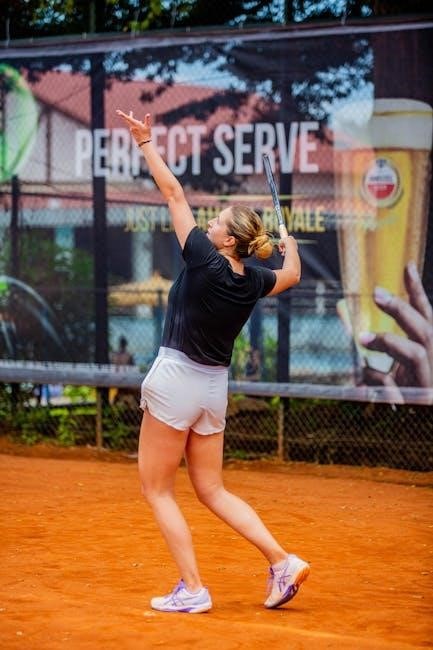forbes standards of service training pdf

Forbes Service Excellence is a global benchmark for service quality, emphasizing personalized guest experiences and staff empowerment, ensuring consistent high standards in the digital era․
1․1 Overview of Forbes Service Standards
Forbes Service Standards are a comprehensive framework ensuring exceptional guest experiences․ They emphasize personalized service, staff empowerment, and consistent excellence․ These standards guide hotels, restaurants, and spas to deliver memorable interactions, focusing on anticipation of needs, flawless execution, and genuine care․ The benchmarks include specific protocols for arrivals, communication, and problem-solving, ensuring a culture of continuous improvement and guest satisfaction․
1․2 Importance of Service Excellence in the Digital Era
Service excellence is vital in the digital age, where guest expectations are heightened by instant access to information and reviews․ Personalized, proactive service distinguishes organizations, fostering loyalty and differentiation․ Forbes standards emphasize consistency, empathy, and empowerment, ensuring seamless experiences that meet evolving demands and create lasting impressions in a competitive landscape․
Understanding Forbes Five-Star Hospitality Standards
Forbes Five-Star Standards define exceptional hospitality through personalized service, staff empowerment, and meticulous attention to detail, ensuring unforgettable guest experiences that surpass expectations and build lasting loyalty․
2․1 Key Principles of Five-Star Service
Forbes Five-Star Service emphasizes personalized attention, staff empowerment, and exceeding guest expectations through anticipation and precision․ It fosters a culture of excellence, ensuring every interaction is memorable, consistent, and tailored to individual preferences, creating a truly luxury experience that builds lasting guest loyalty and distinguishes exceptional hospitality providers in the industry․
2․2 How Forbes Evaluates Service Quality
Forbes evaluates service quality through rigorous assessments of personalization, staff initiative, and consistency․ Evaluators focus on how staff anticipate needs, resolve issues discreetly, and maintain a seamless experience․ Attention to detail, emotional intelligence, and the ability to exceed expectations are key criteria, ensuring Forbes standards reflect exceptional hospitality and luxury service delivery across all guest interactions․
Core Elements of Forbes Service Training
Forbes Service Training focuses on personalized service, staff empowerment, and consistency․ It emphasizes understanding guest needs, proactive problem-solving, and creating memorable experiences․ The program integrates emotional intelligence, clear communication, and adaptability to ensure exceptional service delivery in modern hospitality, fostering loyalty and exceeding expectations through continuous improvement and staff development․
3․1 Personalized Service and Guest Recognition
Personalized service and guest recognition are cornerstone elements of Forbes Service Training․ Staff are trained to anticipate guest needs, use guest names, and tailor experiences to individual preferences․ This approach fosters a sense of belonging and ensures memorable interactions․ Recognition practices, such as acknowledging repeat guests and celebrating special occasions, further enhance loyalty and satisfaction, creating a truly exceptional experience․
3․2 Staff Empowerment and Decision-Making
Forbes standards emphasize empowering staff to make decisions autonomously, enabling them to address guest needs promptly and effectively․ Training focuses on building confidence and authority, allowing employees to resolve issues without escalation․ This autonomy not only enhances service efficiency but also boosts staff morale, creating a proactive and responsive team dedicated to delivering exceptional guest experiences consistently․
Greeting and Arrival Protocols
Forbes standards emphasize a warm, personalized welcome, using guest names, and efficient baggage handling to create a seamless arrival experience, setting the tone for exceptional service․
4․1 Standard Operating Procedures for Guest Arrival
Forbes standards outline precise arrival protocols, including a warm greeting using the guest’s name, efficient luggage handling, and streamlined check-in․ Staff are trained to ensure seamless transitions, from initial phone contact to arrival, with clear SOPs for telephone etiquette, permission before holding calls, and prompt service․ These procedures aim to create a flawless first impression, setting the tone for exceptional service․
4․2 Creating a Memorable First Impression
Forbes standards emphasize the importance of a warm, personalized greeting using the guest’s name, anticipating needs, and showcasing attentive service․ Staff are trained to create a seamless arrival experience, ensuring guests feel recognized and valued․ Attention to detail, from initial contact to arrival, sets the tone for exceptional service, fostering loyalty and exceeding expectations from the very first moment․

Communication Skills in Forbes Service Training
Effective communication is the cornerstone of Forbes service training, emphasizing clarity, tone, and non-verbal cues to ensure seamless interactions, fostering trust and understanding with guests․
5․1 Effective Verbal and Non-Verbal Communication
Effective communication in Forbes training involves clear, concise verbal exchanges and attentive non-verbal cues like eye contact and body language․ Staff are trained to actively listen, ensuring understanding and empathy, while maintaining a calm and professional tone․ This dual approach fosters trust and ensures guests feel valued and understood throughout their experience․ Proper communication is key to service excellence․
5․2 Active Listening and Problem-Solving
Active listening is a cornerstone of Forbes training, focusing on fully engaging with guests to understand their needs and concerns․ Staff are trained to identify issues promptly and employ effective problem-solving techniques, ensuring seamless resolutions․ This approach not only addresses guest concerns but also enhances their overall satisfaction, demonstrating a commitment to excellence and fostering loyalty through swift, thoughtful solutions․
Anticipating and Exceeding Guest Expectations
Forbes standards emphasize anticipating guest needs through personalized service and proactive approaches, ensuring expectations are exceeded to create memorable experiences․
6․1 Understanding Guest Needs and Preferences
Understanding guest needs and preferences is critical for delivering exceptional service․ Forbes standards emphasize recognizing individual preferences through observation, feedback, and personalized interactions․ Staff are trained to anticipate needs, ensuring tailored experiences that exceed expectations, fostering loyalty and satisfaction․ This approach creates memorable stays by aligning services with guest desires, demonstrating a genuine commitment to excellence․
6․2 Proactive Service Delivery
Proactive service delivery is a cornerstone of Forbes standards, focusing on anticipating guest needs before they arise․ Staff are trained to observe cues, act swiftly, and resolve issues discreetly․ This approach ensures seamless experiences, enhancing guest satisfaction and loyalty․ By being one step ahead, hotels create a culture of excellence, turning moments into lasting memories through thoughtful, attentive service․

Handling Special Requests and Complaints
Forbes standards emphasize efficient management of special requests and complaints, ensuring prompt resolution and guest satisfaction through clear protocols and staff empowerment․
7․1 Managing Guest Complaints Effectively
Managing guest complaints effectively involves active listening, empathy, and swift resolution․ Forbes standards train staff to acknowledge issues promptly, offer solutions, and maintain professionalism, ensuring guest satisfaction and loyalty through clear communication and problem-solving strategies․
7․2 Fulfilling Special Requests with Precision
Fulfilling special requests with precision ensures guest satisfaction and loyalty․ Forbes standards emphasize attention to detail, clear communication, and timely execution, allowing staff to anticipate and meet unique needs effectively, enhancing the overall guest experience through personalized service and proactive delivery․

Consistency in Service Delivery
Consistency in service delivery ensures uniform excellence across all guest interactions, maintaining high standards and fostering trust, with continuous improvement driving sustained service quality and guest satisfaction․
8․1 Maintaining High Standards Across All Interactions
Maintaining high standards across all interactions is crucial for delivering exceptional service․ Forbes standards emphasize consistency, ensuring every guest touchpoint adheres to excellence․ Staff are trained to anticipate needs, use guest names, and uphold precise protocols․ This uniformity in service fosters trust and satisfaction, aligning with the digital era’s demands for seamless, personalized experiences․
8․2 Continuous Improvement in Service Quality
Continuous improvement is vital to upholding Forbes standards․ Regular feedback sessions and staff training ensure service quality evolves․ By analyzing guest feedback and industry trends, teams refine their approaches, integrating new techniques to enhance experiences․ This commitment to growth ensures services remain exceptional, aligning with changing guest expectations in the digital age․
The Role of Staff Training in Forbes Standards
Staff training is crucial in achieving Forbes standards, ensuring personalized service and staff empowerment through comprehensive programs, ongoing feedback, and continuous development for consistent excellence and guest satisfaction․
9․1 Comprehensive Training Programs
Forbes standards emphasize comprehensive training programs tailored to enhance service excellence․ These programs focus on personalized guest recognition, proactive service delivery, and effective communication․ Training includes practical scenarios, role-playing, and theoretical knowledge to ensure staff can anticipate and exceed guest expectations consistently․ Continuous learning opportunities are provided to keep staff updated on evolving standards and industry trends․
9․2 Ongoing Feedback and Development
Ongoing feedback is crucial in Forbes standards, ensuring continuous improvement․ Regular assessments and constructive criticism help staff refine their skills․ Development programs include workshops, mentoring, and performance reviews, fostering growth and adaptability․ This approach ensures service quality remains exceptional, aligning with guest expectations and industry evolution, while maintaining Forbes’ high benchmarks for excellence in hospitality and customer service delivery․

Implementing Forbes Standards in Modern Hospitality
Forbes standards integrate seamlessly with modern hospitality, leveraging technology to enhance service delivery while maintaining personalized experiences․ Adapting to evolving guest expectations ensures sustained excellence and relevance in the industry․
10․1 Integrating Technology with Service Excellence
Forbes standards integrate technology to enhance service excellence, leveraging CRM systems and AI-driven tools to anticipate guest needs․ These innovations streamline operations while maintaining personalized experiences, ensuring efficiency without compromising the human touch that defines Forbes service excellence․
10․2 Adapting Standards to Changing Guest Expectations
Forbes standards evolve to meet shifting guest expectations, emphasizing personalized experiences and proactive service․ By understanding modern preferences, such as sustainability and digital convenience, Forbes-trained staff adapt seamlessly, ensuring high-quality service remains relevant while maintaining timeless excellence in hospitality, fostering loyalty and satisfaction in an ever-changing industry landscape․

Measuring Success and Guest Loyalty
Forbes measures success through guest feedback, loyalty metrics, and satisfaction scores․ Continuous improvement and personalized service drive long-term relationships, ensuring exceptional experiences align with evolving expectations․
11․1 Metrics for Evaluating Service Quality
Forbes evaluates service quality through guest feedback, satisfaction scores, and loyalty metrics․ Key indicators include consistency in service delivery, staff responsiveness, and the ability to exceed expectations․ Feedback is collected via surveys, reviews, and direct interactions, ensuring actionable insights․ High scores reflect personalized attention, proactive problem-solving, and memorable experiences, ultimately driving repeat visits and long-term guest loyalty․
- Guest satisfaction scores
- Feedback from reviews and surveys
- Consistency in service delivery
- Staff responsiveness and problem-solving
11;2 Building Long-Term Guest Relationships
Building long-term guest relationships is crucial for loyalty and retention․ Forbes standards emphasize personalized interactions, consistent service, and proactive engagement․ Staff training focuses on recognizing preferences, anticipating needs, and delivering memorable experiences․ Regular communication, exclusive offers, and tailored programs foster deep connections․ Satisfied guests become loyal advocates, driving repeat business and positive word-of-mouth, ensuring sustained growth in a competitive market․
- Personalized service and recognition
- Consistent, high-quality interactions
- Proactive engagement and communication
- Loyalty programs and exclusive offers
- Implementing guest feedback for improvement
Forbes Service Training remains a cornerstone of hospitality excellence, evolving to meet modern demands while maintaining its core principles․ Continuous improvement, technology integration, and staff development will sustain its relevance, ensuring exceptional service delivery in an increasingly competitive industry․
- Evolution of service standards
- Integration of technology
- Focus on staff development
- Adaptation to industry changes
12․1 The Evolution of Service Excellence
Service excellence has evolved significantly, with Forbes standards adapting to modern guest expectations․ Personalized experiences, staff empowerment, and technology integration are key developments․ These advancements ensure service quality remains a competitive differentiator, driving loyalty and satisfaction in the hospitality industry․
- Adaptation to guest expectations
- Integration of technology
- Focus on personalized experiences
- Continuous improvement in service delivery
12․2 Sustaining Forbes Standards in a Competitive Industry
Sustaining Forbes standards requires continuous training, feedback, and adaptability․ Hotels must invest in staff development and technology to maintain high service quality․ Proactive service delivery and consistent guest experiences ensure long-term loyalty and differentiation in a competitive market․
- Continuous staff training and development
- Integration of feedback systems
- Adaptability to industry trends
- Technology-driven service enhancements
Leave a Reply
You must be logged in to post a comment.